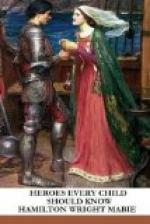Queen Sieglind said: “If you are still minded to go, then I will prepare for you and your companions the best raiment that ever warrior wore.”
Siegfried bowed low to his mother, saying: “So be it; only remember that twelve comrades only will I take with me.”
So the Queen and her ladies sat stitching night and day, taking no rest till the raiment was ready. King Siegmund the while commanded that the men should polish their war-gear, coats of mail, and helmets, and shields.
The thirteen comrades departed and, on the seventh day, they rode into the town of Worms in Rhineland, a gallant company, bravely arrayed, for their garments flashed with gold, and their war-gear, over their coats of mail and their helmets, were newly polished. Their long swords hung down by their sides, even to their spurs, and sharp were the javelins which they held in their hands. The javelin of Siegfried was two spans broad in the blade, and had a double edge. Terrible were the wounds that it made. Their bridles were gilded, and their horse-girths of silk. A comely sight they were to see, and the people came from all round to gaze upon them.
Tidings had been brought to King Gunther that certain warriors were come, very gallant to look upon and richly clad, but that no one knew who they were, and whence they came. “Now,” said the King, “this troubles me much that no one can tell whence these warriors come.” To him Ortwein, the High Server, made answer, “Seeing, sire, that no man knows aught about these strangers, let some one fetch Hagen, my uncle; he knows all the kingdoms of the world, and the dwellers therein.”
So Hagen went to the window and looked at the men. Well pleased was he with their clothing and their gear of war; but he had never seen their like in the Rhineland. So he said: “Whencesoever these men have come, my lord, that they are princes or of a prince’s company is clear. But stay; Siegfried, the famous hero, I have never seen with my eyes, but I verily believe that is he. If it indeed be, there is no warrior in this land, that is his match for strength and valour.
“Once upon a time riding alone, with none to help him, he came upon the treasure of the Nibelungs. It had been newly taken out of the hollow of a mountain, and the Nibelungs were making ready to share it. And when they saw him, one cried aloud, ’Here comes Siegfried, the great champion from the Motherland!’ So the two princes of the Nibelungs bade him welcome, and would have him divide the treasure among them. A mighty store it was, of jewels such plenty that scarce five-score wagons could carry them away, and of red gold yet more. All this they would have Siegfried divide among them. And for his wages they gave him the Nibelungs’ sword. But little did they know what should befall at his hand. For lo! ere he had ended his dividing, they stirred up strife against him. Twelve stout comrades had the princes, and with these the princes thought to




